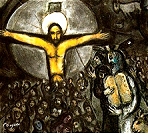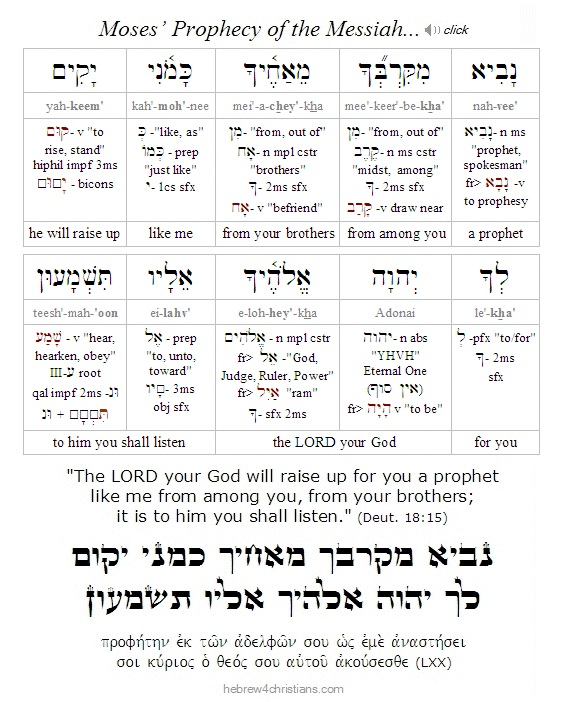|
"Do not think that I shall accuse you to the Father; there is one who accuses you -- Moses, in whom you trust. For if you believed Moses, you would believe Me; for he wrote about Me. But if you do not believe his writings, how will you believe My words?" - (John 5:45-47).
In our Torah portion for this week, parashat Shoftim, we read Moses' great prophecy of the Messiah: "The LORD your God will raise up for you a prophet like me from among you, from your brothers -- it is to him you shall listen" (Deut. 18:15). Although there is not a lot of detail given in this prophecy, there is enough to determine the necessary conditions regarding the essential qualifications for the great prophet to come. For instance, God would "raise up" this prophet for , the verb "raise" used in this verse (i.e., קוּם) alludes to the divine power of resurrection (תְקוּמָה). This prophet also would "be like" Moses (כָּמֹנִי), which means that he would exhibit the same characteristics of Moses, that is, a chosen savior of Israel who performed miracles, taught Torah, and offered his life up for the welfare of the people in the service of the LORD...
Now the relatively recent religion called "Islam" claims that this prophet to come was Muhammad from Arabia (died 632 AD), though that is certainly false, since Moses clearly said that the prophet to come would be a Jew who would be from the people Israel ("from among you"), not from another nation, and particularly not from the descendants of Ishmael (i.e., from Hagar rather than Sarah; see Gen. 17:19-22; Gal. 4:22-26).
"These arguments (that Muhammad is the prophet foretold by Moses) have been rehearsed so often that they have become nauseating. It is not enough to declare that they are altogether feeble; to cite as proofs these verses is ridiculous and absurd in the extreme. Neither the untutored multitude nor the apostates themselves who delude others with them believe in them or entertain any illusion about them. Their purpose in citing these verses is to win favor in the eyes of the Gentiles by demonstrating that they believe the statement of the Koran that Mohammed was mentioned in the Torah. The Muslims themselves put no faith in their arguments, they neither accept nor cite them, because they are manifestly so falicious."
"They assert in wicked defiance that they believe most firmly in the prophecy of Moses, as the Arabs and Byzantines say yet they destroy and nullify his law and kill the adherents thereof. Whoever joins them is just like his seducer." - Maimonides (Epistle to Yemen)
"There shall step forth a star out of Jacob, and a scepter shall arise out of Israel. And shall smite through the corners of Moab, and break down all the sons of Seth. And Edom shall be a possession, Seir also, even his enemies, shall be a possession, while Israel doeth valiantly" (The Torah: Num. 24:17-18).
Yet what characteristics were to mark this great Jewish prophet to come? To answer that question wisely, we must consider the life of Moses to discern someone who would be "like" him, that is, someone who would serve as an analog to his mission and life....
Consider then that after being chosen by God to deliver Israel from bondage during the time of the Exodus, Moses became 1) the mediator (priest) of the covenant between God and the Jewish people, 2) the legislator the various commandments of the Torah, and 3) the prophet who received the vision of the Mishkan (the Altar), the future exile, and the ultimate destiny and glory of Zion. Moses was extraordinary because as the mediator of Israel, he instituted various sacrificial rites before the laws of sacrifice were enacted. For example, he instituted the Passover sacrifice in Egypt (Exod. 12:1-11), and when the people later reached Mount Sinai, he offered blood sacrifices to ratify the terms of the covenant (Exod. 24:8). As the great legislator of Israel, Moses declared the terms of the covenant, serving as its voice of authority. And finally, as the great prophet of Israel, Moses ascended the mountain and received the vision of the Mishkan (i.e., Tabernacle) before the priesthood had been instituted in Israel (Exod. 25:8-9). And even after the laws of the priests were proclaimed and the Mishkan was set up, Moses went before the very Holy of Holies to directly hear the Voice of the LORD, even though technically speaking this was forbidden, since he was not a kohen (i.e., descendant of Aaron). Indeed our Torah portion this week (i.e., parashat Naso) concludes, "And when Moses went into the tent of meeting to speak with the LORD, he heard the Voice speaking to him from above the mercy seat (i.e., kapporet: כַּפּרֶת) that was on the Ark of the Testimony, from between the two cherubim; and it spoke to him" (Num. 7:89). Near the end of his life, Moses message to Israel was summarized in a prophetic song called Ha'azinu that foretold Israel's entire history, past, present, and including the future redemption of the Jewish people.
I mention all this because some people stumble over the fact that Yeshua, who was from the tribe of Judah, served as Israel's High Priest of the New Covenant, but Moses was from the tribe of Levi . But remember, though Moses was a Levite, he himself was not a member of the priesthood, even though he had defined the role of the sacrificial system to Israel and enjoyed direct access to the presence of the LORD within the sacred chamber of the Mishkan itself. Of course this issue is addressed in the Book of Hebrews, where the role of the "Malki-Tzedek priesthood" is ascribed to King Yeshua (Heb. 5:6-11; 7:1-19), but it is important to realize that Moses himself foresaw the coming of the Messiah as Israel's great Prophet, Priest and King (Deut. 18:15-19; John 5:36). Therefore, just as Moses himself was "outside" the law by serving as Israel's priest - yet was commissioned by God Himself - so also with Yeshua, who instituted the sacrifice of His blood as the Lamb of God and who went directly before God's Throne to intercede on our behalf as the Mediator of the New Covenant (for more on this subject see "Moses' Prophecy of the Messiah").
Hebrew Lesson:
Deut. 18:15 reading (click):
Like the patriarch Joseph before him, Moses was a "picture" of Yeshua in various significant ways. Though he was a Jew from the tribe of Levi, he appeared as a "prince of Egypt" to his own people and was educated in all the wisdom of the Egyptians (Acts 7:22). And though he was God's chosen deliverer, Moses was initially rejected by the Israelites and then turned to the Gentiles, taking a "foreign" bride. After being severely tested in the desert, he was empowered by God's Spirit to become Israel's deliverer for their hour of great tribulation. Indeed, both Moses and Yeshua were "sent from a mountain of God" to free Israel. Both revealed the meaning of God's Name; both spoke with God "face to face." Moses was sent from (physical) Mount Sinai in Midian; Yeshua was sent from a spiritual "Mount Zion" in Heaven (Heb. 12:22). The New Testament relates that Moses and Elijah later met with Yeshua to discuss His "departure," literally, "His Exodus" (τὴν ἔξοδον αὐτοῦ) that he would accomplish at Jerusalem to redeem the entire world (Luke 9:30-31).
How, then, was Yeshua a Prophet "like Moses"? Well, like Moses, he was a Jew, a Leader, a Prophet, a Lawgiver, a Savior, a Teacher, a Priest, a Healer, an Anointed One, a Mediator between God and man -- speaking the words of God -- and like Moses, He offered himself to die for the sins of the people. Blessed be the name of the Lord forever....
Related Article:
|



